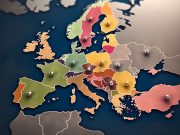Are you dreaming of traveling to Europe? It can be an amazing experience, but how much money do you need for your trip? Before planning your escape, it’s important to know the costs associated with a European vacation. From hotels and transportation to food and activities, there are plenty of expenses that come along with a jaunt across the continent. With careful budgeting and savvy spending, you can enjoy all the best aspects of Europe without breaking the bank! Keep reading to learn more about what it takes to make your dream vacation become reality.
Estimating Your Travel Budget
Traveling to Europe is a dream come true for many. It’s no wonder, considering the rich culture and history that awaits you. But how much money do you need to prepare? Although it may seem intimidating at first, with careful planning and bargain shopping, your European adventure can be surprisingly affordable.
When it comes to eating out in Europe, there are plenty of opportunities for bargain hunters. From street food stalls serving up delicious specialties like paella or falafel, to small family-run restaurants offering excellent value set menus; tasty meals don’t have to cost an arm and a leg! And if all else fails, supermarkets and bakeries offer great options for cheaper snacks on the go.
No matter what type of traveller you are – budget backpacker or luxury traveler – knowing exactly where your hard-earned cash goes will help you make the most of every euro spent during your time in Europe. So before booking your ticket, take some time to plan ahead and figure out how much money you’ll need – so you can enjoy your trip without burning through your bank account.
Finding Affordable Accommodations
Europe is an incredible destination for travelers looking to explore its many cultures, sights, and experiences. But with so much to see and do, it can be hard to know how much money you need in order to make the most of your trip. One way to save on expenses is by taking advantage of budget airlines or split stays; this allows you to travel around Europe without breaking the bank.
When booking flights, always look for deals – there are plenty out there if you’re willing to take the time and research. Flying from one city to another? Try a budget airline like Ryanair or EasyJet. If you’re planning on visiting multiple cities during your stay, consider split-stays instead – they allow you book two separate rooms at different hotels while still saving money overall compared to staying in one place throughout your entire vacation.
Accommodations aside, food costs should also factor into your budgeting plans as well; eating out every night can quickly add up! Fortunately, there are several ways that you can save some extra cash when dining abroad such as splitting meals or exploring local markets for snacks that won’t break the bank. With all these tips in mind, it’s easy to plan ahead and get the most out of your European adventure without putting too much strain on your wallet. Now let’s move onto analyzing transportation costs…
Analyzing Transportation Costs
To get the most bang for your buck when planning a trip to Europe, you’ll need to look into comparing airlines and bargain hunting. It’s not enough to simply book the first flight out; there are certain tricks of the trade that can make all the difference in saving money on transportation costs.
Scouring online resources such as travel websites or airline comparison sites is an important part of finding great deals. Additionally, being flexible with dates and times can also help lower fares significantly. It never hurts to be persistent either–sometimes calling up an airline directly will net you better results than booking through a third party website.
Put simply: take some time researching options before settling on one solution. With just a few clicks (and perhaps some phone calls) it’s possible to save hundreds if not thousands of dollars by carefully selecting which flights work best for your budget. By taking this approach, you’re sure to have plenty left over to enjoy all that Europe has to offer!
Making The Most Of Your Money
Now that you have a better idea of potential transportation costs, it’s time to make the most out of your money. Tracking expenses and utilizing packing strategies will help stretch your budget further.
When planning for Europe, create an itemized list in order to track how much you are spending. In addition to regular food and lodging expenses, don’t forget about smaller items such as souvenirs or other unique experiences you want to take part in during your trip. Make sure to include any taxes associated with each purchase so there won’t be any surprises when you get home.
Packing is also a great way to save some extra cash while traveling abroad. Bring only what you need; if something can be purchased at your destination, leave it at home! Don’t fall into the trap of buying multiple items that do the same thing either; one pair of shoes should suffice for a few weeks away from home. The less stuff you bring, the lighter your suitcase – which could save on airline baggage fees.
By following these tips, you’ll be able to plan ahead and maximize every penny spent on this exciting adventure! With careful consideration of all aspects of travel, from tracking expenses to packing strategies, Europe may just become a reality sooner than expected…
Travel Insurance Considerations
Traveling to Europe is an exciting experience that can quickly turn into a financial disaster without the right pre-planning. According to recent research, the average family of four spends around $7000 on their European vacation. This amount varies greatly depending on your destination and budget.
No matter what type of traveler you are, having a packing checklist and knowing what insurance coverage may be needed will help ensure you have all the necessary items for a successful trip. Pre-planning should include researching where you’ll stay, how much money you need for food and transportation, and making sure your passport is up to date. Additionally, consider purchasing travel insurance which will cover any unexpected medical bills or lost luggage during your journey.
When traveling abroad it’s also important to familiarize yourself with local customs so that you don’t accidentally break any laws or offend anyone unknowingly. As long as travelers do some pre-trip planning and research before they depart, they are sure to have a wonderful time in Europe!
Frequently Asked Questions
What Is The Best Time Of Year To Visit Europe?
The best time to visit Europe depends on what kind of weather you’re looking for, as well as your budget. Summer is the most popular season, with warm temperatures and plenty of sunshine in many parts of the continent. However, this can also be an expensive period due to higher airfares from budget airlines; so if you’re looking for a cheaper option then spring or autumn may be better alternatives. During these seasons the weather patterns are still pleasant but won’t break the bank. Whether traveling solo or with family or friends, visiting Europe at any time of year will give you memories that last forever!
What Are The Most Popular Tourist Destinations In Europe?
Coincidentally, Europe is a perfect destination for travelers who are searching for the ultimate freedom experience. From Paris to Prague and beyond, there’s no shortage of amazing places to explore on your next vacation. One popular tourist spot is Amsterdam, where you can compare costs with different vendors while enjoying stunning architecture and art galleries. Language barriers aren’t much of an issue either: most people in major cities will speak at least some English. No matter which city you choose, you’re sure to have unforgettable memories that will last a lifetime!
What Are The Best Ways To Save Money When Traveling In Europe?
When it comes to traveling in Europe, budgeting tips and travel insurance can be essential for saving money. One way to save on accommodation is by booking hostels or staying with friends instead of hotels; both options are typically less expensive than traditional lodging. Additionally, avoid costly restaurants when possible and opt for street food, which tends to be much cheaper while still delicious! Consider using public transportation rather than taking a taxi from point A to B, as well as packing light so you don’t have to pay excess baggage fees at the airport. Ultimately, mindful spending combined with smart planning will help you enjoy your trip without breaking the bank.
Are There Any Visa Requirements For Traveling To Europe?
Travelling to Europe is like a passport to freedom – with the right cost-saving tips and an understanding of visa requirements, you can unlock new cultures and experiences. Whether you’re looking for vibrant cities or tranquil countryside, your dream holiday awaits – but before taking off make sure that you have all the necessary documents in order. You’ll need a valid passport that won’t expire during your visit, and depending on where you’re going there may be additional visa requirements too. Make sure to check this in advance so that you don’t end up stranded at the airport!
Are There Any Safety Considerations To Take Into Account When Planning A Trip To Europe?
Planning a trip to Europe? It’s important to consider safety first! Before you set off, make sure to look into currency exchange rates and invest in travel insurance. Doing these two things can help give you peace of mind while traveling abroad, as they’ll provide extra financial security if anything goes wrong. Additionally, it never hurts to research the area you’re visiting ahead of time – so be sure to check out any crime statistics or local laws that could affect your journey. With the right preparation, you’ll have an unforgettable experience exploring all that Europe has to offer!
Conclusion
Traveling to Europe is an exciting and enriching experience, but it can also be expensive. With some careful planning, however, you don’t need a fortune to enjoy the continent’s beautiful cities and attractions. From booking flights in advance to finding budget-friendly accommodation options, there are plenty of ways to make your European vacation cost effective. Just remember to take into account any visa requirements or safety concerns before heading out on your adventure! Who knows? You may even end up having more money than you thought when you come back home!




























